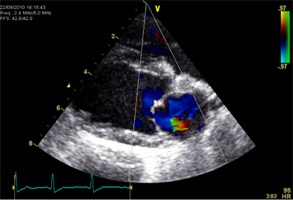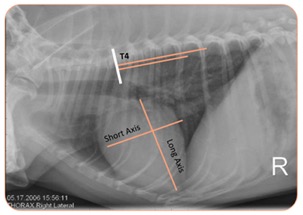Heart Murmur in Dogs
The Heart Anatomy
The heart is a hollow, muscular organ that is made up of four chambers (the right atrium and the left atrium as well as the right ventricle and the left ventricle). These four chambers are separated by a wall and two valves. The tricuspid valve separates the right atrium from the right ventricle while the mitral valve separates the left atrium from the left ventricle. There is also another set of valves: the pulmonary valve that separates the right ventricle from the pulmonary artery and the aortic valve which separates the left ventricle from the aorta.

What is a Heart Murmur?
When your vet is listening to your dog’s heart through a stethoscope, they can hear the rhythmical lub-dub. This sound is made from the normal opening and closing of the heart valves. When there is any turbulence of blood flow, the lub-dub is replaced by a swoosh noise – swoosh-dub, swoosh-swoosh, etc. This is what we call a heart murmur.
It is important to know that a heart murmur is not a name for a disease, but a name for what we hear – and heart murmurs can be caused by many different conditions. It is important to note that a heart murmur is different to heart arrhythmia. Heart arrhythmia is defined as an irregular heartbeat or when the heart beats out of rhythm.
What causes Heart murmur in Dogs?
As noted, a heart murmur is caused by turbulent blood flow within the heart. A heart murmur can also be classified as an innocent/ physiologic murmur. A physiological heart murmur is usually caused and has no impact on the dog’s health. This most often occurs in young puppies and they eventually outgrow the murmur by around 4-5 months of age. If your vet has detected an innocent heart murmur in your young puppy, your vet will most likely recommend listening to the heart again when your puppy is 4-5 months of age. If the heart murmur is still present, a cardiac work up will be warranted.
More commonly, heart murmurs in older dogs are caused by cardiac disease (pathological murmurs) or diseases unrelated to the heart (extracardiac diseases).
What is the Grading Scale for Heart Murmurs in Dogs?
Not all heart murmurs sound the same. Some have different intensity, location and time. The intensity of the murmur does not usually correlate with the severity of heart disease. Veterinarians grade the intensity of the heart murmur into 6 different grades.
- Grade I—barely audible murmur
- Grade II—soft murmur
- Grade III—intermediate loudness murmur; most murmurs which are related to the mechanics of blood circulation are at least grade III
- Grade IV—loud murmur
- Grade V—very loud murmur
- Grade VI—very loud murmur with a vibration strong enough to be felt through the animal’s chest wall
What kind of cardiac disease causes a heart murmur?
A heart murmur caused by cardiac disease can be either congenital or acquired.
Congenital heart diseases in puppies are hereditary and include diseases such as:
- Patent ductus arteriosis (PDA)
- Pulmonic stenosis
- Sub-aortic stenosis
Acquired heart diseases are caused by cardiac diseases and develop in adult dogs. This includes:
- Myxomatous Mitral Valve Degeneration also known as Mitral insufficiency, Mitral regurgitation or MMVD. This is a heritable disease seen in breeds including the Cavalier King Charles Spaniel, Cocker spaniel, Chihuahua, Miniature Poodle, Boston terrier, and Miniature Schnauzer.
- Dilated Cardiomyopathy also known as DCM. This is a heritable disease seen in breeds including the Doberman Pinscher, Great Dane, Boxer, and the Cocker Spaniel.
- Endocarditis – This infection of the heart valves occurs when bacteria from other parts of your dog’s body, such as dental disease, spreads through the bloodstream and lodges in your dog’s heart.

Source:https://www.epictrial.com
If your vet detects a heart murmur during your dog’s physical exam, certain tests may be recommended depending on the grading and location of the murmur.
The first test that your vet may recommend to investigate your dog’s heart murmur is an echocardiogram. This is an ultrasound of the heart performed by a specialist. An echocardiogram is extremely valuable because it will give us a diagnosis of what is causing the heart murmur. It will also examine the health of the heart valves, measure the blood pressure to the lungs and examine any secondary changes to the heart including abnormal thickness of the ventricles.
- It allows us to look at the lungs to see if there is any fluid.
- It helps to evaluate if the heart is putting any pressure on the windpipe
- Allows us to measure the heart size

Source: https://www.epictrial.com
What are the signs of a heart murmur?
There can be no overt clinical signs if we detect the heart murmur in the early stages. However, most dogs develop clinical signs as they develop into the later stages. Every year your vet will listen to your furbaby’s heart for any murmurs during their yearly health check ups.
Will my dog’s heart fail?
Heart murmurs with pathological heart diseases usually progress into congestive heart failure. This is a serious condition and can be fatal. Commonly, dogs that are in heart failure will have an accumulation of fluids in their lungs. Dogs with heart failure may also have a cough, exercise intolerance or difficulty breathing.
Signs of congestive heart failure:
- Lethargy
- Fainting
- Collapsing
- Coughing
- Gagging
- Trouble breathing
- Exercise intolerance
- Reduced appetite
- Swelling in the abdomen
- Muscle loss
Coughing from heart diseases can be caused by two reasons.
- Dilation of the heart size which leads to compression of the windpipe
Potential backflow of blood which leads to fluid buildup in the lungs - Coughing can also be a sign of respiratory diseases such as bronchitis, allergies, pneumonia, asthma or kennel cough. Hence, it is very important for your vet to perform a thorough workup.
How do you treat a Heart Murmur?
Treatment for your dog’s heart murmur will depend on the underlying cause. An innocent murmur will not require any treatment, but regular monitoring of your dog’s heart condition is usually recommended to ensure no other problems develop.
A heart murmur caused by cardiac disease may require medication(s) and a specialised diet. Your dog will need regular vet visits for routine monitoring every 6 months. This may include a repeat echocardiogram and/or x-rays depending on your dog’s conditions.
Your veterinarian will advise you on the best course to treat and monitor your dog’s heart murmur.
What is the prognosis of a Heart Murmur?
Your veterinarian will discuss the prognosis and treatment options for your dog as each case is specific and different. In all cases, ongoing monitoring and regular diagnostic testing are needed to monitor the heart murmur.
At My Vet Animal Hospital, we work closely with specialists in small animal medicine and a board accredited cardiologist, Dr Damon to formulate the best treatment and monitoring plan for your furbaby’s heart murmur.


